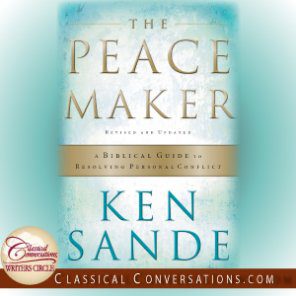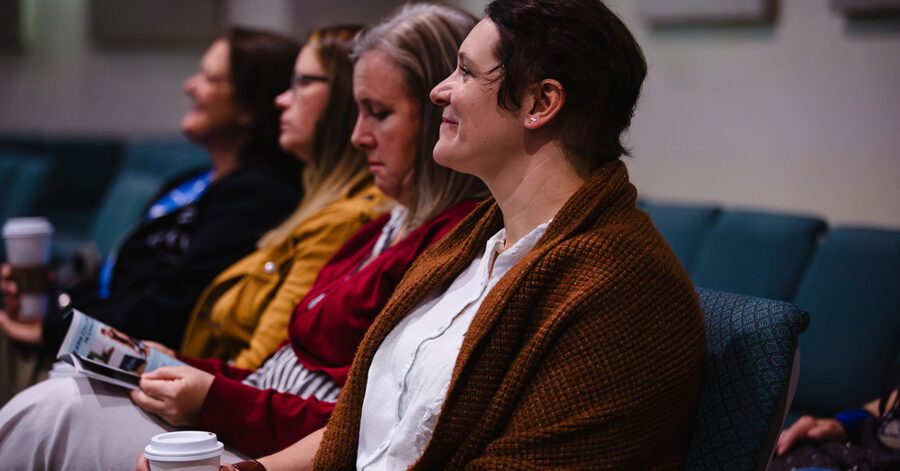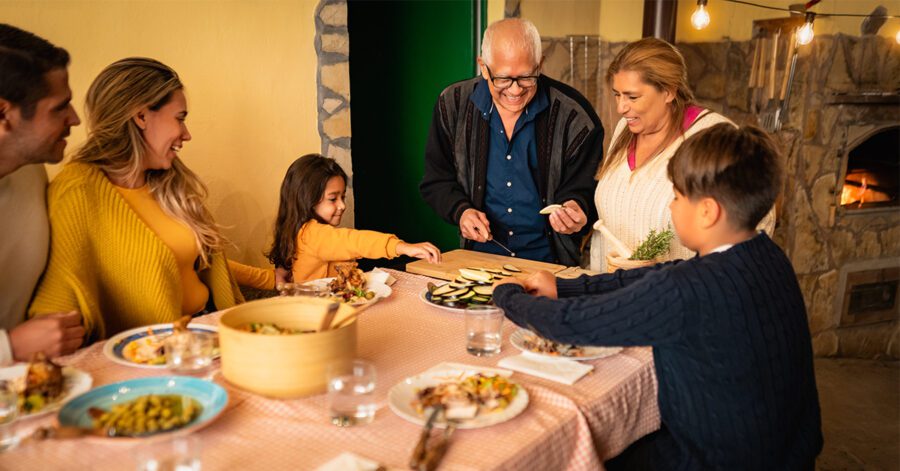The Peacemaker Monthly
Mending
by Cara McLauchlan
“Speaking the truth in love, we will in all things grow up into him who is the Head, that is, Christ.” — Ephesians 4:15
The summer before I went to high school, I made quilts for fire victims. Despite having only sewn in home economics class, it was laughable that someone would pay me to sew all summer long. Yet, with the prospect of earning money, I willingly spent my entire summer in a dark church basement with other teens sewing quilts for hours.
 When I first started making the quilts, I made them quickly, haphazardly, without a care. I remember thinking, “Would fire victims really care what their quilt looked like?” However, as the summer pressed on, I slowed down, took precision in my selection of fabric and materials. The thoughts weighed heavy on my heart, “This might be the only thing they have left. This will be the first thing they get after losing everything. This matters.”
When I first started making the quilts, I made them quickly, haphazardly, without a care. I remember thinking, “Would fire victims really care what their quilt looked like?” However, as the summer pressed on, I slowed down, took precision in my selection of fabric and materials. The thoughts weighed heavy on my heart, “This might be the only thing they have left. This will be the first thing they get after losing everything. This matters.”
The idea that things matter, even little things, stayed with me. This quilt would be the very beginning of mending their lives. It would be a comfort. This blanket made by my humble hands would be a reassurance that slowly their lives would heal. It might even be wrapped around a girl like me.
Mending feels like a throwback word, something my grandmother would say or do, but our lives are full of mending. We mend all the time. We mend hurt feelings, struggling kids, critical parents, family members seeking reassurance—we all need someone to help us mend. Right now I am caring for my aging mother who is beyond physical mending, but finds comfort in mending words and deeds.
 The very sound of the word has a nurturing feeling, like a pot of soup, a soft sweater, a warm fire. Mending is about putting back together what is broken or tattered by this world. Through Jesus’s mending in us, we experience His restoration first hand, so we know how to share it with others.
The very sound of the word has a nurturing feeling, like a pot of soup, a soft sweater, a warm fire. Mending is about putting back together what is broken or tattered by this world. Through Jesus’s mending in us, we experience His restoration first hand, so we know how to share it with others.
In The Peacemaker, Ken Sande beautifully discusses how we can look to mend what is broken in our relationships. In chapter seven, he refers back to how the word “restore” (katartizo) means “to mend, repair, equip, complete and prepare” in order to allow each of us to reach our full purpose that God intended for our lives.
“The word “restore” (katartizo) is used several times in the New Testament—to describe fishermen mending and preparing their nets (Matt 4:21), to describe Pauls’ supplying what is lacking in the Thessalonians’ faith (1 Thess. 3:10), to describe Jesus’ equipping believers with everything good for His will (Heb 13:21) and God’s restoring those who have suffered and making them strong, firm and steadfast” (page 155).
Sande addresses the fact that we are designed to serve God in a specific way and we cannot achieve our full potential if we don’t mend our torn places of the spirit. As Christians and by faith, our aim should be what the word “katartizo” represents.
“Thus, we can see that the goal of katartizo, as used in Galatians 6:1, is to mend broken people and restore them to usefulness in God’s kingdom” (page 155).
Sande highlights important strategies for gently restoring and discovering appropriate means to address conflict and brokenness in our lives. There are opportunities for mending everywhere. Our words have the power to heal, to correct or hold accountable, to encourage, to be the healing balm to broken relationships with the simple words of “I’m sorry” or “I am on your side.”
He shares many wise and excellent thoughts on addressing restoration when we are in conflict. Below are a few favorite gems from chapter seven which I have paraphrased:
Let It Roll – Not everything needs to be addressed. At times we need to let things roll off our backs.
You Just Know – Deep down in our hearts, we know when something needs to be addressed in a loving way. It’s having the courage to do it in a way that is about love and not anger.
Talk in Person – He suggests that when you have something difficult to say, do it in person. He also suggests that you admit your own role as part of the situation or how you may be contributing to the problem.
Lastly, these two ideas are my favorites and do not need an explanation:
“Talk from Beside, Not Above,” and
“Help Others Examine the Desires of Their Hearts.”
I love that sweet vision of addressing conflict with another, quietly engaging beside them and talking things over to share each other’s’ heart. Isn’t that the way Jesus mends us? He meets us where we are and quietly speaks into our hearts through examination.
I never quilted again after that summer. Now, I look at a quilt with a certain knowing of all the love and hours that are poured into it. You cannot create a piece like it without leaving a bit of your soul woven in its making. This is so much like the lives we lead, God’s great design for our hearts mends us in His love. Through His perfect mending, we can live fully into our purpose for Him.
Read Along in The Peacemaker
Read Part 3 – Gently Restore – Chapters 7 and 8 (pages 139-184)
Good Questions:
- How would you answer Sande’s opening question in Part 3, “How can I lovingly serve others by helping them take responsibility for their contribution to this conflict?”
- Can you think of a time when you demonstrated the love of Christ in the midst of conflict? How easy or hard was it for you?
- How do you know when a conflict needs to be addressed or when it needs to be overlooked?
- What best practices do you consider when addressing a conflict or issue with another person?
- Sande says on page 158 that we should “not try to talk to others about their wrongs until you have dealt with your contribution to the problem.” How easy or hard is it for you to see your role in situations?
- Chapter 8 is titled “Speak Truth in Love” and Sande encourages us to “help others examine the desires of their heart” when discussing conflict. What do you think that truly looks like? How is that carried out?
- Have you ever had a time when you were addressing a conflict with someone and it ended poorly or without resolution? What would you do differently? Or what did you learn from the experience?




